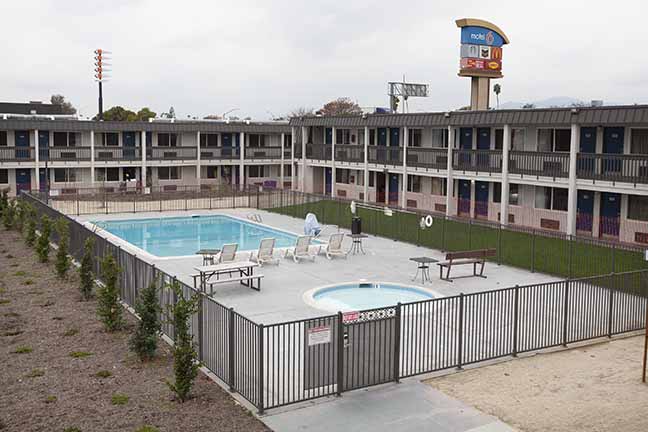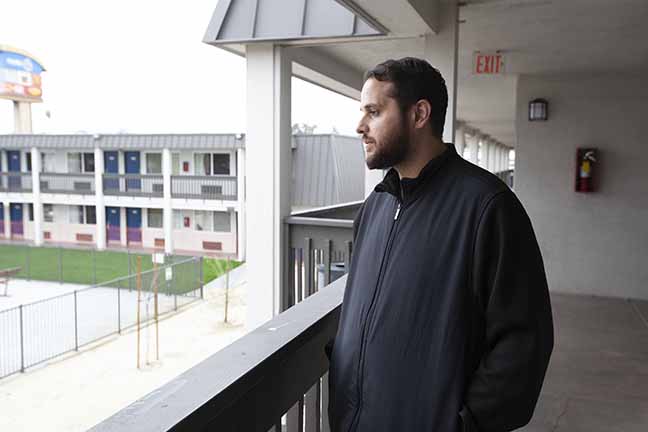Motel ordinance is making positive change

Motel 6 on Indian Hill Boulevard is one of three inns adjacent to the 10 Freeway where criminal activity had become a problem. Improvements to the property, and a new hotel/motel ordinance, have resulted in a significant reduction in problems at the motel. Courier photo/Steven Felschundneff
by Steven Felschundneff | steven@claremont-courier.com
The city unveiled the first scheduled update on the progress of the hotel/motel ordinance passed by the Claremont City Council last March during Tuesday’s meeting.
In her report, Katie Wand, assistant to the city manager, said the news was mostly good, although much work remained to fully remedy what had become an entrenched problem of prostitution and criminal activity at Claremont’s freeway-adjacent motels.
Reevaluating and replacing an old and outdated motel ordinance was identified as a goal during the Claremont City Council’s priorities workshop in January 2022. It was also among the top quality of life concerns for the motels’ neighbors who said crime in the south part of Claremont was becoming intolerable.
The council approved the ordinance by a 5-0 vote on March 14, 2023. Proprietors of all motels and hotels must abide by it if they wish to continue operating in the city.
Among the ordinance’s provisions, a prospective guest would have to present valid government identification and a credit or debit card before checking in. An employee would then visually verify that the card belongs to the guest and make a scan of the document. A credit card verification would be required even if the guest pays for the room with cash.
Other provisions include:
- Management will have to keep a register with detailed guest information, keep those files for four years, and must allow city officials to inspect the records.
- The inns must have a daily cleaning schedule that includes removing trash from the room and linens must be changed every three days, even if a guest does not check out.
- Parking permits must be displayed on the dashboards of guest’s and/or visitor’s cars.
- Common areas, including parking lots and hallways, must be monitored via closed circuit television cameras that have the ability to record.
- No one can stay in the same room for 30 consecutive days, or 60 days during a 180-day period. The minimum stay is 18 hours for motels and overnight for hotels.
With the understanding that each motel or hotel will have its own business model, the ordinance leaves the door open for managers to receive a variance from certain rules using the conditional use permit process. Only select provisions in the code could be avoided through this process, such as the minimum and maximum stay limits. Other rules, including the credit card requirement and guest register, are not subject to modification by motel owners.

Ali Jaffrey, general manager of Motel 6 on Indian Hill Boulevard, says he’s proud of the improvements that have been accomplished at the property over the last year to 18 months. Courier photo/Steven Felschundneff
According to Wand, three hotel proprietors — DoubleTree, Casa 425, and Residence Inn — applied for conditional use permits under the ordinance and received some concessions. The Knights Inn, which is adjacent to the 10 Freeway, is currently being demolished to make way for the new Residence Inn.
Two motels adjacent to the 10 Freeway — Motel 6 and Claremont Lodge — did not ask for variances to the new rules. The original ordinance offered hoteliers a discounted $1,250 flat fee for the conditional use permits necessary to opt out of some of the law’s provisions. On Tuesday the council authorized a one-year extension of that discounted price in case owners at Motel 6 or the Claremont Lodge decide to apply for exemptions.
The ordinance also created a city interdepartmental team, consisting of the city attorney Alisha Patterson, Wand, members of the police department, community improvement employees and a citizen representative. The team was established to “proactively address criminal and nuisance activity at hotels and motels, particularly at freeway motels,” according to a staff report.
It’s the job of the city interdepartmental team to monitor how well the ordinance is performing and report back quarterly to the police and planning commissions. The city will also update the council yearly on the ordinance’s status.
According to data provided by Wand, in 2022, the year before the ordinance passed, the Claremont Police Department had 359 calls for service at Motel 6. It had just 208 in 2023. While other hotels and motels reported declines, none was as dramatic as at Motel 6. That may be partly due to the fact that it was the property from where the most calls for service were emanating prior to the ordinance going into effect.
On Wednesday, Motel 6 General Manager Ali Jaffrey said Tuesday’s progress report felt like the project had come full circle and now the motel, city and the neighbors had a “two way bridge” to collectively reduce problems and make the motel a better place for the community.
Jaffrey said after he became general manager in October 2022, the company voluntarily adopted several of the measures that would eventually make it onto the hotel motel ordinance. That included keeping a vehicle register and requiring a credit card to rent a room.
He also mentioned the $750,000 the owners have spent refurbishing the grounds, including the installation of improved lighting. However, these improvements were not voluntary on the part of Motel 6, but were required to bring the property into compliance with municipal code.
On Wednesday, the landscaping at the motel appeared to be mostly finished, though a construction fence remained around the central courtyard. Jaffrey said the fence is needed a little while longer to keep guests from damaging the new plantings while they are becoming established. He also showed off a line of ficus trees that will one day provide privacy to the homes directly behind the motel.
“We have a much healthier relationship with the neighbors and with the city,” Jaffrey said. “It took some time but since then I think we have flourished.”
Vickie Noble, a resident of south Claremont, remarked on the progress that has been made in the past year and credited the hard work of Wand and others city employees for much of that change.
“Look at the difference in how Motel 6 is dealing with us,” said Noble. “We actually have a two way relationship with them now. It really gives us who live in south Claremont a lot of continued hopes because there is a lot of improvement going on.”







0 Comments